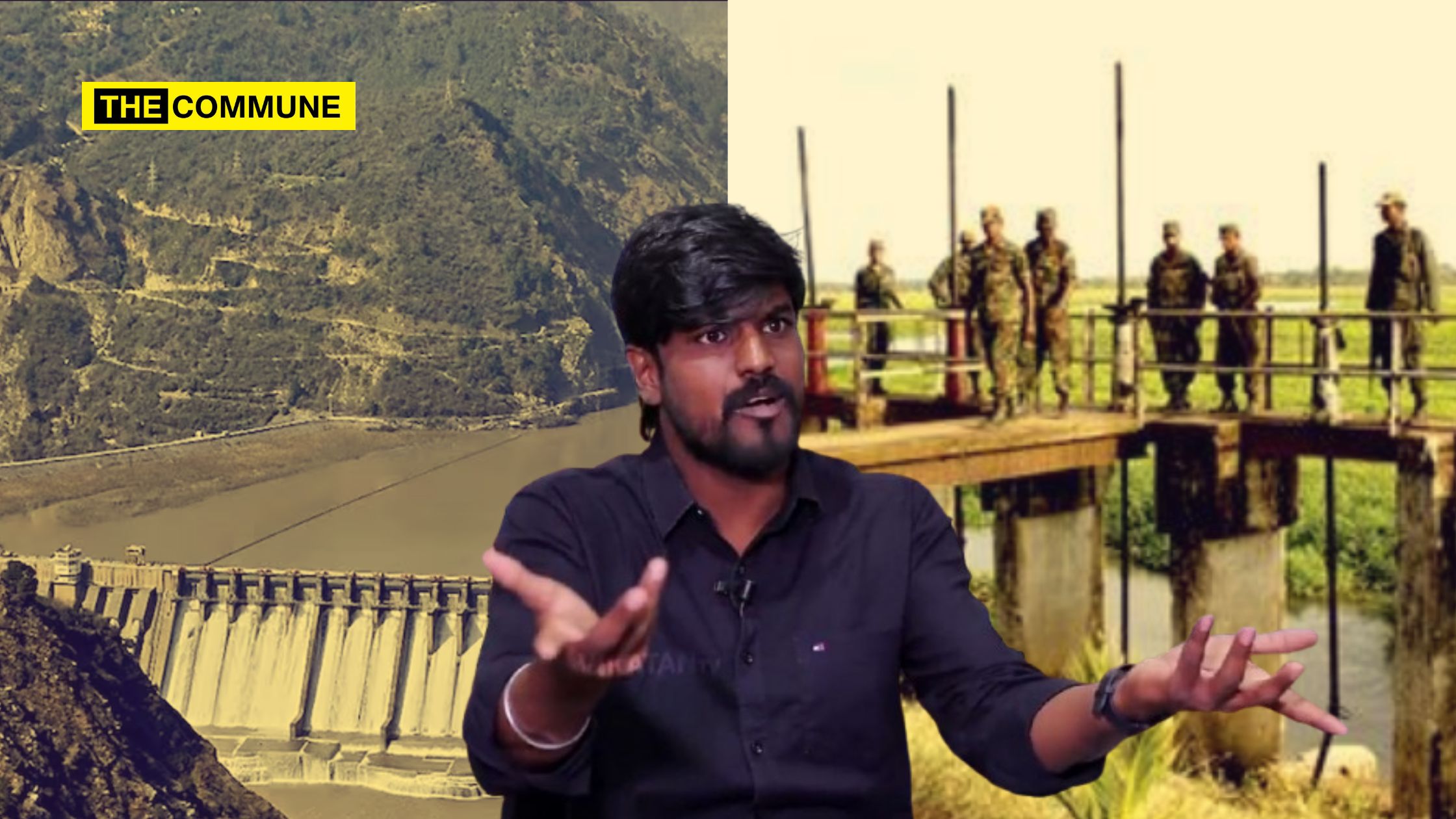
Following the rant from Dravidianists and Periyarists, the Naam Tamilar Katchi (NTK), a Tamil nationalist party, has now stirred controversy by expressing sympathy for Pakistan in the wake of the 22 April terrorist attack in Pahalgam, Jammu and Kashmir, which claimed the lives of 25 Hindu tourists. In response to the attack carried out by Pakistan-backed militants—India has suspended the 64-year-old Indus Waters Treaty (IWT), marking a significant diplomatic shift.
Amid this tense backdrop, NTK functionary Idumbavanam Karthik, whose residence and office were previously raided by the National Investigation Agency (NIA) in connection with an LTTE-linked arms case, took to his official X (formerly Twitter) account to criticize India’s decision. Quoting the Geneva Convention of 1949, he wrote, “Blocking the flow of water, even if it is a warring enemy country, is a war crime that starves the people of that country!”
போரிடும் பகை நாடாக இருப்பினும் நதிநீரைத் தடுப்பதென்பது அந்நாட்டு மக்களைப் பட்டினிக்குத் தள்ளும் போர்க்குற்றம்!
– ஜெனீவா ஒப்பந்தம் (1949)
— இடும்பாவனம் கார்த்திக் (@idumbaikarthi) April 24, 2025
Karthik’s remarks sparked widespread backlash, especially given the brutality of the recent attack, where Hindu tourists were reportedly targeted, forced to recite Islamic declarations, and some even subjected to religious identification methods before being executed. The public outrage has been further inflamed by selective outrage and appeasement, with left-leaning propagandists and certain political voices avoiding condemnation of the Pakistani-backed terrorists while shifting focus toward defending India’s Muslim population for political gain.
Prime Minister Modi responded strongly to the incident, condemning both the terror attack and Pakistan’s continued support for cross-border terrorism. However, the new sympathy from NTK leaders for Pakistan—a nation repeatedly warned about its terror affiliations—has only added fuel to an already volatile situation.
In response to NTK member and LTTE sympathizer Idumbavanam Karthik’s criticism of India’s suspension of the Indus Waters Treaty with Pakistan—where he called it “inhumane” and a violation of humanitarian norms—netizens were quick to call out the hypocrisy.
They reminded him of the 2006 Mavil Aaru incident in Sri Lanka, where the LTTE, as a pressure tactic, shut the sluice gates of a crucial dam on July 20, cutting off water to nearly 15,000 predominantly Sinhala families cultivating over 30,000 acres of farmland. This act of depriving civilians of water directly contradicts the moral high ground Karthik attempted to claim.
According to a detailed Hindustan Times report from that time, the Mavil Aaru water dispute escalated into a full-scale military confrontation between the Sri Lankan government and the LTTE. While both parties presented the issue as a humanitarian dispute over water, the reality was deeply rooted in military and political ambitions, especially in the strategically vital Eastern Province.
For the LTTE, the move was part of a broader strategy to regain influence in the East following the defection of senior commander Col. Karuna in 2004. Gaining local support by securing resources for Tamil communities while denying them to Sinhala settlers—seen by many Tamils as state-sponsored colonizers—served both symbolic and strategic purposes.
The region around Mavil Aaru, particularly in Trincomalee district, holds significant emotional and strategic value for both sides. While the LTTE views the East as an essential part of the Tamil homeland, the Sri Lankan state has long sought to maintain control over it due to its ethnic diversity, agricultural wealth, and access to the Trincomalee harbor—one of the world’s best natural ports.
The LTTE’s decision to block water flow was met with outrage and led to military retaliation after negotiations mediated by Nordic truce monitors failed. Although the Sri Lankan government initially labeled its airstrikes as “humanitarian operations” to restore water access, many experts argued that broader strategic motives were at play—namely, weakening the LTTE’s operational capacity and leadership in the East.
The LTTE had reportedly fortified its positions and was using water control as leverage while the government launched air and ground operations to disrupt reinforcements and eliminate key commanders. Strategic areas such as Mullaitivu, Batticaloa, and Iranamadu were also targeted to disable the LTTE’s nascent air capabilities and sever its supply and communication lines.
Ultimately, netizens found it ironic that Karthik would cite humanitarian law in defense of Pakistan—a country accused of sponsoring terrorism—while appearing to ignore the LTTE’s history of weaponizing water access against civilians. The Mavil Aaru blockade remains a stark example of how humanitarian needs were manipulated for military gain, undercutting Karthik’s moral argument.
Below are some netizens criticism:
Appo idhu..https://t.co/zOkBvg9XvK
— Living Temples Of Bharat (@Saigeet36566874) April 25, 2025
மேதகு இருந்திருந்தா உன்ன இன்னிக்கு செருப்புல அடிச்சிருப்பாரு pic.twitter.com/UMZFBcvMOz
— காஸ்மிக்பிளின்கர் (மோடியின் குடும்பம்) 🇮🇳 (@cosmicblinker) April 25, 2025
https://t.co/AkPT8vTfIK https://t.co/lCbS0QTwxQ
— Varun (@varunmayu) April 25, 2025
தன் மக்களையும் தன் நிலத்தையும், மக்களின் உடைமைகளையும் காக்க. எதை வேண்டுமானாலும் செய்யலாம் என்பதே ராஜிய தர்மம். நீர் வேண்டுமென்றால் தீவிரவாதத்தை வளர்க்காமல், நாட்டை வளர்க்க வேண்டும். மாற்றி செய்தால் பிச்சை எடுக்க வேண்டும்..
அவனுங்களுக்கு பதிலா நீ பிச்சை எடுக்காதே.— Rabid Dog (@RabidDogWarRoom) April 25, 2025
டேய் நீ அந்த தீவிரவாதிய அப்பான்னு சொன்னவன் தம்பி தானே 🤭 pic.twitter.com/iu0Og7JvHo
— கமலி❤️ (@Shivasakthi238) April 24, 2025
அப்படியா சகோ? என்ன பண்றது வருத்தமாக தான் இருக்கு !!! ஆனால், நாங்க அப்படி தான் பண்ணுவோம்.பிடிக்கலை என்றால், நீங்களும் 48 மணி நேரத்தில் இங்கிருந்து கிளம்பி பாகிஸ்தான் போய், அந்த நாட்டு மக்களை பட்டினியில் இருந்து பாதுகாக்கும் வழியை பாருங்க.
— SeethaRaaman Krishnan (@SeetharaamanK) April 24, 2025
அப்பறம் ஏண்டா சுண்ணி சிங்கள இராணுவத்தினர எதிரியா காட்டி பேசுறிங்க, அவனுங்களும் சும்மா சம்பளத்துகாட்டி சண்ட போட்றவனுங்க தானே, சிங்கள மக்கள் என்ன தப்பு பண்ணுணாங்க…? சிங்களன் சிங்களனு கவட்ட கிழிய கத்தி பிச்ச எடுத்து திங்கிறிங்க….?
— பொறியாளன்™🇮🇳 (@rskannanrsn) April 24, 2025
Subscribe to our channels on Telegram, WhatsApp, and Instagram and get the best stories of the day delivered to you personally.




